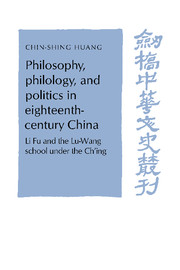 Philosophy, Philology, and Politics in Eighteenth-Century China
Philosophy, Philology, and Politics in Eighteenth-Century China Book contents
- Frontmatter
- Contents
- Foreword by Professor Ying-shih Yü
- Acknowledgments
- Abbreviations
- Introduction
- 1 The original argument (1): “Chu Hsi versus Lu Hsiang-shan” (Chu-Lu i-t'ung): A philosophical interpretation
- 2 The original argument (2): Wang Yang-ming and the problematic of “Chu Hsi versus Lu Hsiang-shan”
- 3 The critical dimension in the Confucian mode of thinking: The conception of the Way as the basis for criticism of the political establishment
- 4 Li Fu: an exemplary Lu-Wang scholar in the Ch'ing dynasty (1): His life
- 5 Li Fu: an exemplary Lu-Wang scholar in the Ch'ing dynasty (2): His thought
- 6 Li Fu and the philological turn
- 7 The price of having a sage-emperor: the assimilation of the tradition of the Way by the political establishment in the light of the K'ang-hsi emperor's governance
- Conclusion
- Chinese glossary
- Bibliography
- Index
1 - The original argument (1): “Chu Hsi versus Lu Hsiang-shan” (Chu-Lu i-t'ung): A philosophical interpretation
Published online by Cambridge University Press: 17 September 2009
- Frontmatter
- Contents
- Foreword by Professor Ying-shih Yü
- Acknowledgments
- Abbreviations
- Introduction
- 1 The original argument (1): “Chu Hsi versus Lu Hsiang-shan” (Chu-Lu i-t'ung): A philosophical interpretation
- 2 The original argument (2): Wang Yang-ming and the problematic of “Chu Hsi versus Lu Hsiang-shan”
- 3 The critical dimension in the Confucian mode of thinking: The conception of the Way as the basis for criticism of the political establishment
- 4 Li Fu: an exemplary Lu-Wang scholar in the Ch'ing dynasty (1): His life
- 5 Li Fu: an exemplary Lu-Wang scholar in the Ch'ing dynasty (2): His thought
- 6 Li Fu and the philological turn
- 7 The price of having a sage-emperor: the assimilation of the tradition of the Way by the political establishment in the light of the K'ang-hsi emperor's governance
- Conclusion
- Chinese glossary
- Bibliography
- Index
Summary
In 1175, Chu Hsi (1130–1200) and the Lu brothers, Chiu-ling (1132–80) and Chiu-yüan (Hsiang-shan, 1139–92) were invited by Lü Tsu-ch'ien (1137–81) to the Goose Lake temple to seek a reconciliation of their long-held divergent views. The theme of this debate constituted one of the major discourses in the history of Neo-Confucianism. The debate itself was significant not only for those philosophers who participated in it, but also for those who developed Neo-Confucianism in later days. Hence, it deserves our detailed scrutiny in order to appreciate its far-reaching implications.
Before their departure for Goose Lake, the Lu brothers had an intellectual exchange so as to reach a common ground between themselves. In the end the elder brother, Chiu-ling, agreed with Hsiang-shan and wrote a poem to express his own view:
Children know love, but in growing up learn respect.
The ancient sages pass on this mind.
Only after the foundation has been laid can a house be built.
No hill will rise without a base.
Fondness for commentaries brings thorns and thistles.
If you are attached to details, you may lose yourself in them.
Value friendship and counsel each other.
Realize that great joy lies in this moment.
However, Hsiang-shan felt somewhat dissatisfied with the second line of his brother's poem, “The ancient sages pass on this mind.” On the way to Goose Lake he wrote a poem in response:
Graveyards evoke sorrow, ancestral shrines, respect.
This man's unpolished Mind through all ages.
Tiny drops make up a mighty ocean,
Small rocks pile up as mounts T'ai and Hua.
[…]
- Type
- Chapter
- Information
- Philosophy, Philology, and Politics in Eighteenth-Century ChinaLi Fu and the Lu-Wang School under the Ch'ing, pp. 4 - 24Publisher: Cambridge University PressPrint publication year: 1995


